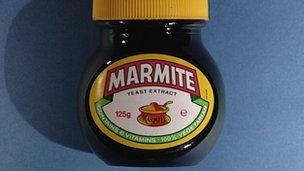Canada orders Briton to stop selling Marmite and Irn-Bru
- Published

The owner of a British food shop in Canada says he has been ordered to stop selling Marmite, Ovaltine and Irn-Bru because they contain illegal additives.
Tony Badger, who owns a chain called Brit Foods, told local media that food safety officials blocked a large import shipment of the popular products.
Mr Badger said he had been selling the items since 1997.
Food safety officials confirmed some items were barred for sale but said only meat was removed from the store.
"We've been bringing Irn-Bru in since the very beginning," Mr Badger told CKOM.
The bright orange caffeinated drink is particularly popular in Scotland, but sold in countries around the world.
"My understanding was we were importing legally. We've been declaring it through a customs broker and we've never had an issue until now," said Mr Badger.
No health risk
Irn-Bru contains the food colouring Ponceau 4R. It is not permitted in foods for sale in Canada, the Canadian Food Inspection Agency (CFIA) said in a statement to the BBC.
The colouring has been linked to hyperactivity.
In addition, the agency told the BBC that "drinks and a yeast-based spread" found in the Brit Foods shipment and subsequently on the shelves in the shops were not approved for sale in Canada.
In a separate statement, the agency told the BBC that Irn-Bru and Marmite were not "banned" from sale in Canada, but that particular formulations intended for sale in Britain that did not meet Canadian food regulations were not allowed.
"Compliant formulations of these products have been available on Canadian store shelves for more than a decade and will continue to be sold in stores across Canada," the agency told the BBC. "The formulations of these particular products found in a recent shipment from the United Kingdom, were not intended for Canada and do not comply with Canada's regulations."
The agency said the shop had come to its inspectors' attention when a shipment was rejected at customs in Montreal because it contained meat.
Canada does not allow importation of beef products from the UK.
The CFIA said that during a follow-up visit to Brit Foods the meat was "placed under detention because of improper documentation".
But the agency said the drinks and spread found at Brit Foods shops, while in violation of Canada's food safety laws, were not a health risk and were not removed from the store shelves.
"These are technical violations of the regulations," the agency told the BBC in a statement. "There is no food safety risk associated with these products."
'Insanity'
Mr Badger said he first ran into trouble in October when his Christmas stock was seized as it was imported from Britain.
He is worried he will no longer be able to import the popular items.
"The concern now is, with the next shipment, if it gets held there may be new issues with new products, so it somewhat paralyses our ability to bring new product in," he said, adding the delays had already cost him thousands of dollars.
But he said the agency was now conducting a health assessment on the foods to determine whether they were fit for sale.
"I haven't heard of anyone dying from consuming Irn-Bru in Scotland or Britain," he said. "So hopefully we will get a favourable decision."
One customer, Briton Nigel Westwick, told the Star Phoenix newspaper that he "couldn't understand the insanity" of preventing Irn-Bru from entering Canada.
"For a country that allows one to buy firearms, guns, bullets... stopping a soft drink suitable for all ages seems a little ludicrous."
The CFIA told the BBC it had initiated an investigation and would "take appropriate action as needed".
- Published24 January 2014
- Published7 August 2013
- Published27 February 2013
- Published25 May 2011
- Published20 March 2013